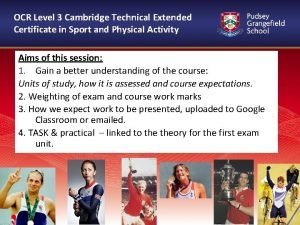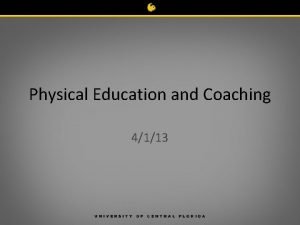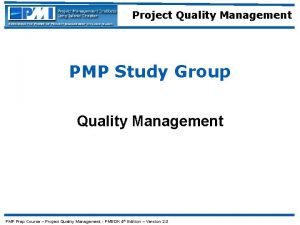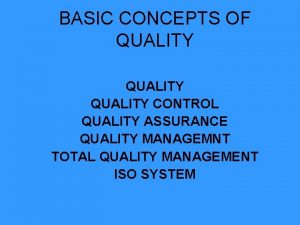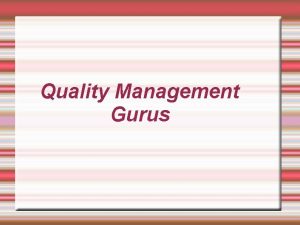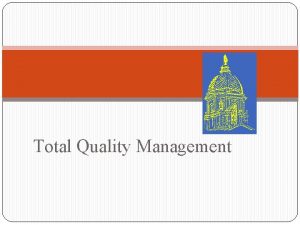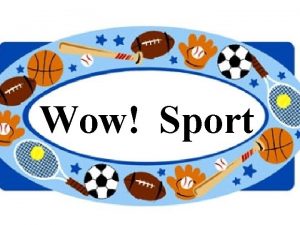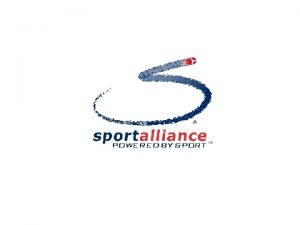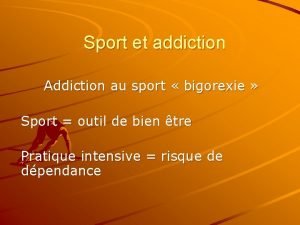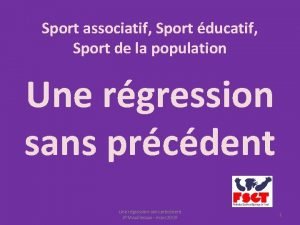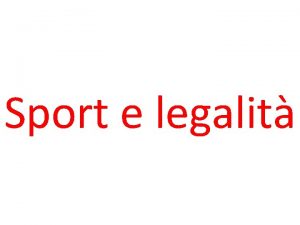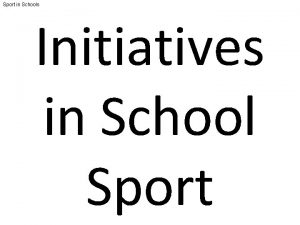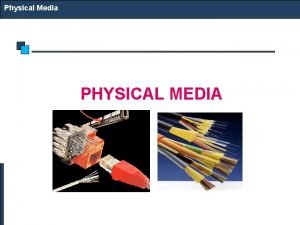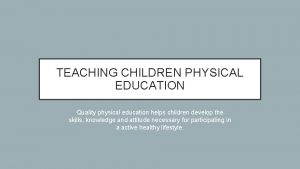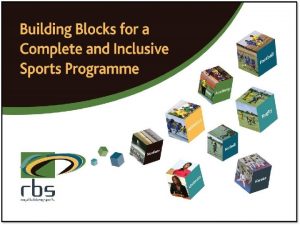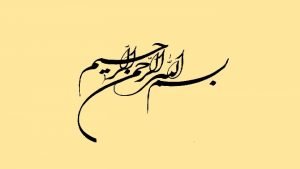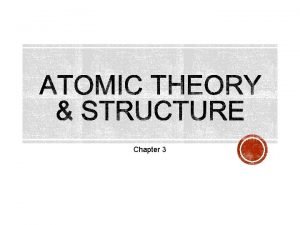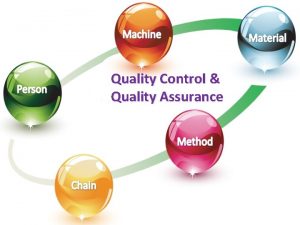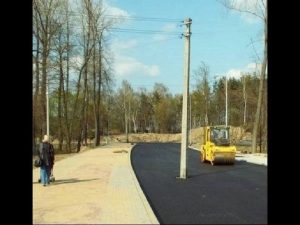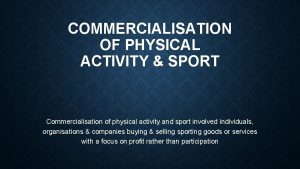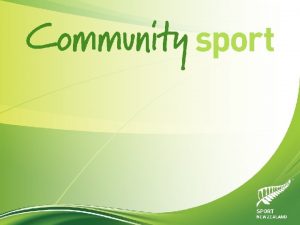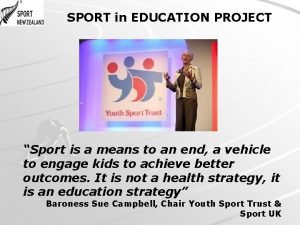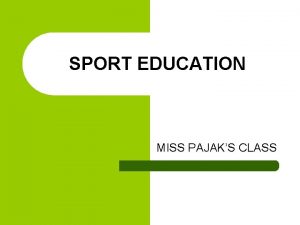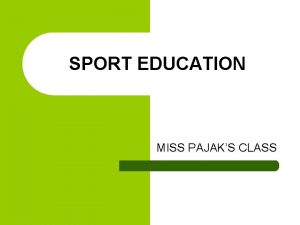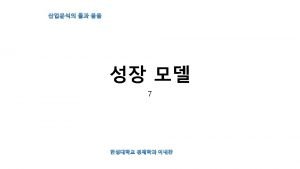Sport Education A model for quality physical education




























- Slides: 28

Sport Education A model for quality physical education through sport

Association with Physical Education �How many of those images relate to a typical Physical Education lesson? �What features of sport do they relate to? ◦ affiliation ◦ festivity ◦ tradition �There is a disconnect.

What is Sport Education? �A model for presenting an authentic, but developmentally appropriate sporting experiences for students in schools �Authentic means it involves those aspects that make sports participation fun and meaningful ◦ festivity and affiliation, as well as meaningful competition �Developmentally appropriate means it engages all students in ways that they can successfully participate

3 Goals of Sport Education Competent Literate understands & values rules values traditions and rituals distinguishes between good and bad sports practices shows skill & strategic understanding Enthusiastic highly engaged

Includes all activities �Not just for traditional team sports �Can be used for most physical activities that are included in physical education programs. • including gymnastics, dance, swimming, track

Sport Education’s Instructional Philosophy �Development and sustaining of small, heterogeneous learning groups ◦ called “teams” �Students learn from each other �Students share in responsibilities

Key features of Sport Education Seasons (rather than units) 1. ◦ Team affiliation 2. ◦ ◦ 5. 6. students stay on the same team throughout Formal and practice competition 3. 4. replicate the phases of a sport season practice games and those that count Record keeping Festivity Culminating event

Three fundamental differences � 1. Participation requirements ◦ everyone plays --- all the time � 2. Developmentally appropriate ◦ modified games ◦ small teams � 3. Diverse roles ◦ not just player ◦ referee, manager, coach etc.

Full participation �Small sided teams �No elimination tournaments �Culminating events for all students �All students experience all roles

Everyone plays all the time Gerald Wallace Reggie Evans Brook Lopez Joe Johnson Tyshawn Taylor C. J. Watson Mar. Shon Brooks Andray Blatche Keith Bogans Mirza Teletovic Kris Humphries Tornike Shengelia Jerry Stackhouse 46: 03 42: 44 41: 53 37: 39 34: 23 18: 58 15: 12 10: 46 7: 15 5: 02 0: 00 50 45 40 35 30 25 20 15 10 5 0 0: 00 1 2 3 4 5 6 7 8 9 10 11 12 13

Roles other than player �Students learn to be coaches, referees, managers, scorekeepers, publicists, and broadcasters, (to name a few). �This hopefully leads to a more complete understanding of sport.

Two main roles �Team roles … ◦ those relating to the effective functioning of one’s team ◦ …captain, equipment manager, fitness leader �Officiating roles … ◦ those relating to the effective conduct of games ◦ …referee, scorekeeper, statistician

Officiating versus

Seasons �Need good period of ◦ (at least 12 -15 lessons) time �More to accomplish ◦ new roles and responsibilities �Need longer for players to reach competence �Allows for students to experience the ebb and flow (highs and lows) of a season

Affiliation -- Constant team �Allows for role differentiation �Individual responsibility relative to the group �Potential for self-growth �Also creates problems ◦ but students learn to work through these, and hence mature

Small learning groups � Students have a stronger sense of control and ownership for their learning � Teachers are relieved of constant “traffic cop” duties � Time on task is increased, especially during dispersed practice � Peer support and pressure within teams serves as an accountability function � Students who tend to disengage are not left alone � It becomes more difficult for students to “hide” from participation

Record keeping �Records used to enhance the sporting experience ◦ simple or complex �Provide feedback for individual/team performance �Used to set future goals �Authentic assessment �Serve the local tradition

Culminating Event �Festive and designed to be fitting climax �Should involve all participants

Festivity �Teams develop identities (names, colors, uniforms) �Records are publicized �Gym can be decorated for finals �Individual/group performance publicized �Rituals and traditions are honored

The Nature of Competition �is . . . fundamental to sport experiences �is closely tied to the pursuit of competence �focuses on doing well. . . the process

The Nature of Competition in Sport Education. . . � Cooperation among players � Students recognize the need for two teams to mutually play by the rules for a game to take place � Emphasizes the totality of sport experience � Student performance off the court counts for league standings � No zero-sum competition � Best teams determined by factors other than simply win-loss

Where to start � Pick a sport/activity that you are comfortable with � Think big – start small ◦ choose your best class � Have few roles (coach, manager, warm-up leader) � Team selection (equal teams – skill level, gender, size, etc. ) � Keep simple records (think of stopping points in action – field goal vs. rebound) � Modify and simplify rules � Hold students accountable for roles (officiating, duty team) � Develop strong managerial routines

Stage 1: Getting Started and Early Skill, Strategy, Rule, and Role Work � Explain concept and goals of Sport Education and what students will be doing in the unit (affiliation, season, formal competition, culminating event, record keeping, and festivity) � Team announcement and affiliation details � Beginning skill practice � Student learn roles � Teacher demonstrates and explains first series of protocols ◦ entry to the gym, first activities, role protocols 3 -5 lessons

Stage 2: Rules Test, more Strategy and Skill work, Prepare Officials � Continue work on skills and strategies � Teach officiating, scorekeeping and fair play � Play initial games with rotating officials -- teacher led explanations � Teacher demonstrates and explains second series of protocols ◦ before first game, between games and post games 3 -4 lessons

Stage 3: Preseason Games �One to two games per class �Focus on helping officials and the efficiency of protocols 4 -5 lessons

Stage 4: Formal competition � Regular season play � Teacher role throughout tournament is to organize, provide skill, strategy, and role feedback, motivate, and record results. � Team not playing officiates (keep score, watch for Fair Play, facilitate game). � Teacher conducts assessments and evaluates officiating and team roles 4 -6 lessons

Stage 5: Post season & celebration � Post-season play begins. � Seeding is based on regular season final standings. � Students vote on awards (team roles, fair play, league champions, best officials, most organized team). � Conduct awards ceremony. � Several students to host ceremony (team publicists).

Awards �Whatever you want to reinforce through the season ◦ improvement, fair play, winning team, effort, roles
 Daryl siedentop
Daryl siedentop Different between health education and health promotion
Different between health education and health promotion Ocr level 3 sport
Ocr level 3 sport Physical activity and sport pedagogy definition
Physical activity and sport pedagogy definition Negatives of commercialisation in sport
Negatives of commercialisation in sport Evaluate and revise in assure model
Evaluate and revise in assure model Quality control and quality assurance
Quality control and quality assurance Plan quality management pmp
Plan quality management pmp Pmbok quality assurance vs quality control
Pmbok quality assurance vs quality control Quality assurance cycle in nursing
Quality assurance cycle in nursing Quality improvement vs quality assurance
Quality improvement vs quality assurance Basic quality concepts
Basic quality concepts Known as the fun uncle of the quality revolution
Known as the fun uncle of the quality revolution Crosby quality is free
Crosby quality is free Old quality vs new quality
Old quality vs new quality Formuö
Formuö Typiska novell drag
Typiska novell drag Nationell inriktning för artificiell intelligens
Nationell inriktning för artificiell intelligens Returpilarna
Returpilarna Shingelfrisyren
Shingelfrisyren En lathund för arbete med kontinuitetshantering
En lathund för arbete med kontinuitetshantering Kassaregister ideell förening
Kassaregister ideell förening Tidböcker
Tidböcker Anatomi organ reproduksi
Anatomi organ reproduksi Densitet vatten
Densitet vatten Datorkunskap för nybörjare
Datorkunskap för nybörjare Stig kerman
Stig kerman Mall för debattartikel
Mall för debattartikel Autokratiskt ledarskap
Autokratiskt ledarskap


